Overview
The American Swiss Foundation was created nearly 80 years ago in response to World War II. Then as now, our mission is to connect and engage Swiss and American leaders through innovative and inspirational programs to strengthen our shared values of liberty, the rule of law, and free enterprise.
Rebuilding the Relationship: The Aftermath of World War II
The American Swiss Foundation’s roots go back to 1945 and the end of World War II. The transatlantic relationship had been badly damaged during the war and needed repair. Against all odds, Switzerland managed to maintain a neutral stance throughout the armed conflict, and that position was frequently misunderstood, if not resented, in the United States. As a result, there was work to be done for the American businessmen who founded the organization—then called American Friends of Switzerland—who knew and valued the common democratic values that are at the core of both countries.
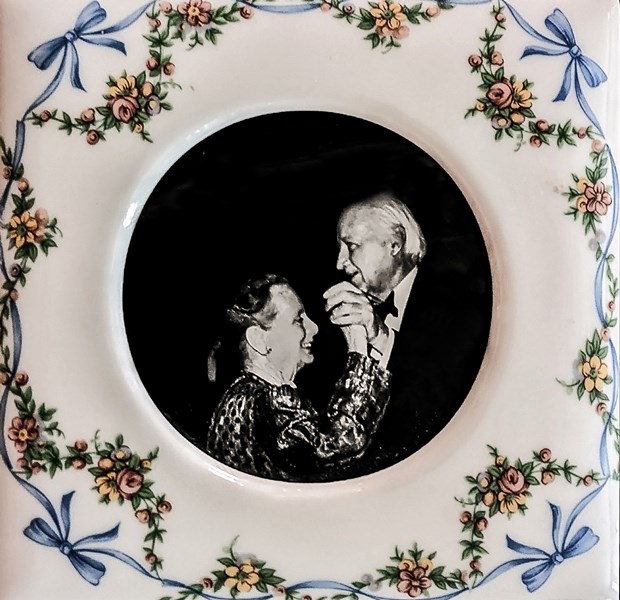 DINNER DANCE, NEW YORK, 1980s
DINNER DANCE, NEW YORK, 1980s
Over the years, the group changed names, and at various times was known as Friends of Switzerland and the American Swiss Association, mirroring the change in focus and priorities of the leadership of the day.
In the first few decades, the activities of the organization were centered on bringing members together for annual gala dinners and occasional gatherings. In these early years, CBS broadcast the galas nationally to 800,000 homes. In 1970, a short write-up of the 25th anniversary dinner dance appeared in The New York Times. The event featured Governor Stanley K. Hathaway of Wyoming as the guest speaker.
The end of the 20th century brought a new focus to the forefront, one centered on leadership. After having served as U.S. Ambassador to Switzerland under both Presidents Nixon and Ford, The Honorable Shelby Cullom Davis became chairman and helped to usher in a new era for the small organization. In fall 1988, Davis, along with top leadership of the American Swiss Association, asked then-U.S. Ambassador to Switzerland Faith Whittlesey to take on the mantle of chairman.
The Young Leaders Conference: Investing in the Next Generation
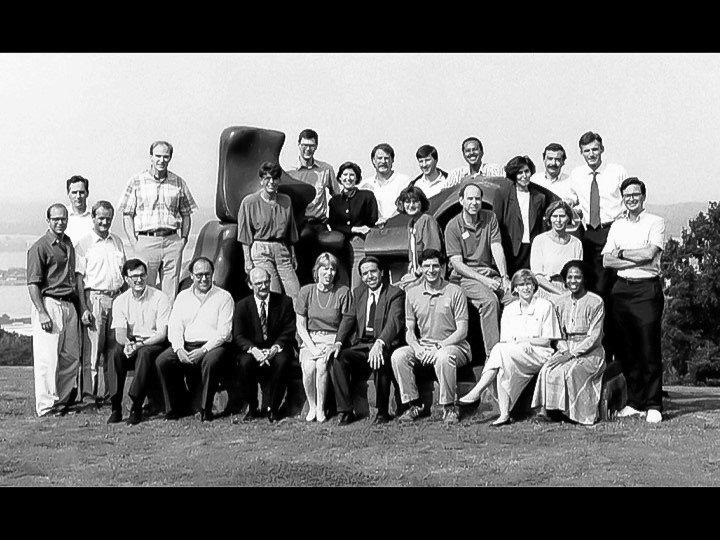 THE FIRST YOUNG LEADERS CONFERENCE, WOLFSBERG, ERMATINGEN, 1990
THE FIRST YOUNG LEADERS CONFERENCE, WOLFSBERG, ERMATINGEN, 1990
In 1989, Ambassador Whittlesey became chairman and president of the newly renamed American Swiss Foundation. After two tours as Ambassador to Switzerland, no one was better suited to breathe new life into the binational group. She brought her signature person-to-person diplomacy as well as the experience and skills she developed during her time in government to create a model of bilateral cooperation through the private sector.
Ambassador Whittlesey took the organization from being social in nature, to one that focused on nurturing and investing in rising leaders from the business, political, and academic worlds, as well as in the media and nonprofit sector. She believed that bringing together the next generation of leaders was critical to revitalizing the organization. Her personal experience with exchange programs as a student contributed to her drive to establish the Young Leaders Conference for the American Swiss Foundation in 1990.
After consultation with leaders of the board and Swiss Advisory Council, Ambassador Whittlesey initiated a week-long series of events, panel discussions, speakers, and excursions in Switzerland to stimulate conversation and friendship between young Swiss and American leaders from a variety of backgrounds. The idea was to generate a fuller, more meaningful understanding of the two countries among their future leaders.
The first Young Leaders Conference took place in Switzerland in August 1990. Speakers were invited, Young Leaders were nominated by senior government and business officials, and sponsors lined up to provide lodging, meals, and airline tickets for the participants. Swissair, UBS, Credit Suisse, Schindler, and Nestlé sponsored the earliest conferences and continue to support the annual program to this day.
Building Bridges: Extending the Conversation through Leadership and Book Program
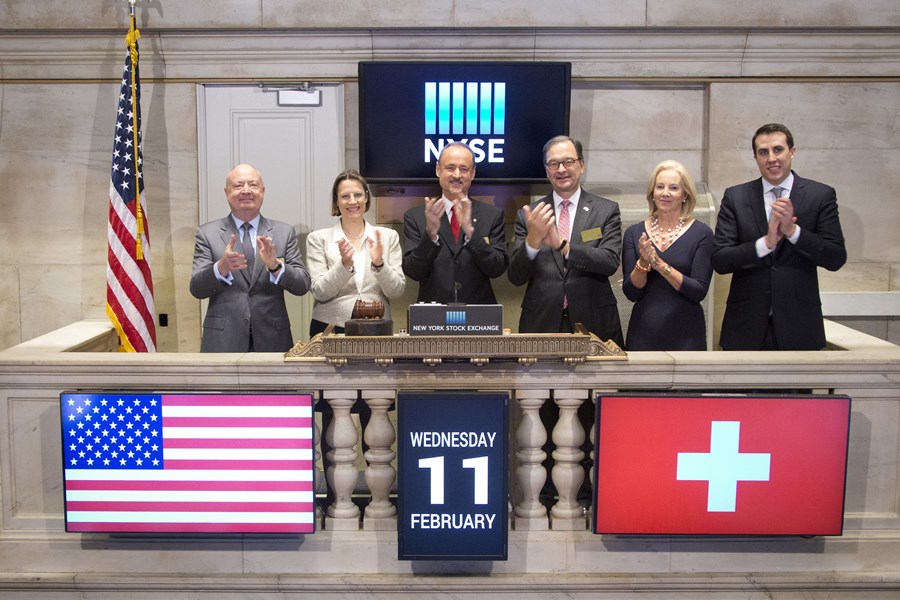 RINGING THE OPENING BELL AT THE NEW YORK STOCK EXCHANGE, 2015
RINGING THE OPENING BELL AT THE NEW YORK STOCK EXCHANGE, 2015
In response to renewed U.S. interest in Switzerland’s role in World War II in the mid-1990s, the American Swiss Foundation initiated a book distribution program, delivering recently published books about Switzerland to hundreds of libraries across the United States. This program was expanded in the early 2000s to include additional topics, among them the excellence of Swiss higher education and the Swiss Vatican Guard.
The Honorable Mercer Reynolds, former U.S. Ambassador to Switzerland, succeeded Ambassador Whittlesey as chairman in March 2008, navigating the Foundation through the storm of the global financial crisis. During this period, early plans were made for a joint U.S.-Swiss reunion of Young Leaders, which eventually came to fruition with the first Building Bridges Conference in September 2012. The triennial event features panels, speakers, and a gala dinner in an institution of prominence in Washington, DC.
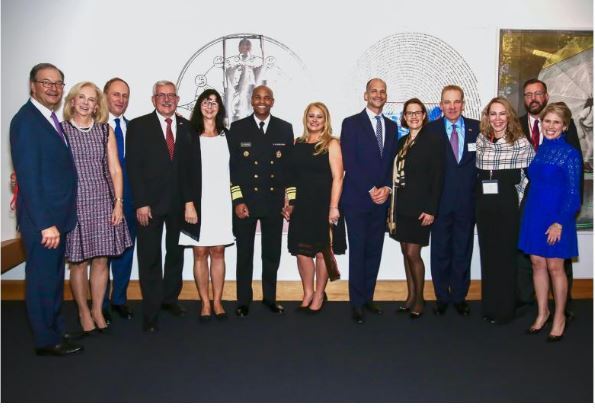 BUILDING BRIDGES CONFERENCE, WASHINGTON, DC, 2018
BUILDING BRIDGES CONFERENCE, WASHINGTON, DC, 2018
In 2011, the American Swiss Foundation elected its first Young Leaders Conference alumnus as Chair. Under the leadership of Steven Hoch (YL 1990), the Foundation expanded its outreach to the now 1,450 alumni through the addition of reunion events—notably the launch of the Building Bridges Conference and Gallatin Forum discussion series in Washington, DC, as well as social media channels.
Two new alumni organizations were founded to advise the board and broaden the financial base of the Foundation. The Young Leaders Alumni Foundation was co-founded in Switzerland by Gabriela Lippe-Holst (YL 2005), and headed by Bettina Schaller (YL 2011). The Young Leaders Alumni Council was co-founded in the U.S. by Charlie Gerow (YL 1998), then chaired by Joe Hurd (YL 2008) and Kent Anker (YL 1994), and, in 2020, merged with the American Swiss Foundation to form a single 501(c)3 organization.
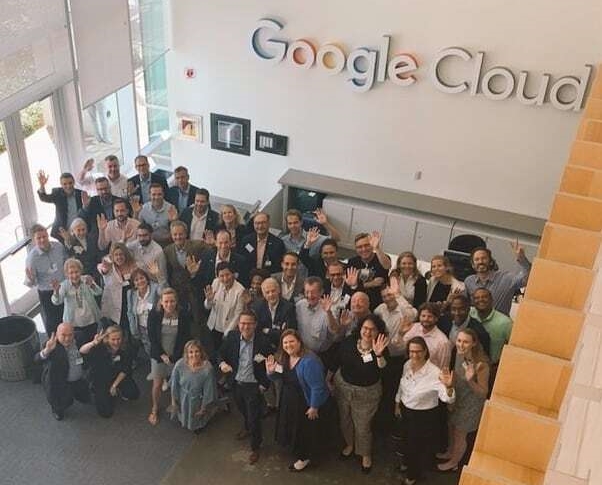 SILICON VALLEY TECH TOUR, 2019
SILICON VALLEY TECH TOUR, 2019
In 2016, Robert Giuffra (YL 1996) was elected Chair. Since that time, the American Swiss Foundation has significantly expanded its digital presence and program offerings to include, for the first time, virtual programs. The Building Bridges Leadership Conference series was expanded to include regional reunions, most notably the Tech Tour in Silicon Valley (2019); an apprenticeship retreat in Chatham, MA (2018); and an apprenticeship and entrepreneurship conference in Ruschlikon (2017). In addition, the Foundation increased its membership outreach by launching a weekly newsletter and monthly briefings in 2016, and a password-protected Young Leaders Directory on its website.
ASF CONNECT: Connecting and Engaging Leaders Today
In 2020, in response to the coronavirus pandemic, the American Swiss Foundation created a new series of virtual programs—the ASF CONNECT conferences— featuring experts from business, government, and healthcare addressing the response to COVID-19. In addition, virtual Young Leaders Reunions via video conference were initiated and continue to be held on a regular basis.
The alumni of the Young Leaders Conference have proven to be effective advocates for the Foundation, encouraging their companies to sponsor or support the annual conference and nominating new Young Leaders to participate in the program.
Today, thanks to the vision of Ambassadors Davis and Whittlesey, the momentum generated by Chairmen Hoch and Giuffra and the steadfast support of the Swiss Advisory Council, now led by ASF Co-Chairman Markus Diethelm, the American Swiss Foundation has become a driving force in U.S.-Swiss relations.
To celebrate its 75th anniversary, the American Swiss Foundation published a booklet with contributions from the U.S. and Swiss Ambassadors and listings of all 1,450 alumni of the Young Leaders Conference.
Ambassador Faith Whittlesey (1939–2018)
1.JPG)
Ambassador Faith Whittlesey was the Grande Dame of American-Swiss relations for nearly four decades. She served as U.S. Ambassador to Switzerland for five years in two tours under the Administration of President Ronald Reagan. She also served on the White House Senior Staff (1983 to 1985) as Director of the Office of Public Liasion. The Honorable Faith Whittlesey served as U.S. Ambassador to Switzerland from 1981 to 1983 and again from 1985 to 1988. She was appointed by President Ronald Reagan. In 1989, she was invited to serve as chairman and president of the American Swiss Association. She initiated the annual Young Leaders Conference in 1990 and served as chairman emeritus until the end of her life.
Upon her return from Switzerland, Ambassador Whittlesey was invited to serve as chairman and president of the American Swiss Foundation in 1989. She initiated the annual Young Leaders Conference the following year. Over the ensuing three decades, she guided the conference planning and recruitment process of U.S. Young Leaders and attended every Young Leaders Conference through 2017. The conference program bore the unmistakable stamp of her knowledge, wisdom, and understanding. As chairman and, later chairman emeritus, she touched the lives of 1,300 conference alumni in Switzerland and the United States in a deeply personal way. She formed and fostered friendships with Foundation board members, as well as with members of the extended community of business, media, and educational leaders and public servants, always mindful of the significance of American-Swiss relations.
A book about her life and career, Backwards in High Heels: Faith Whittlesey, Reagan’s Madam Ambassador in Switzerland and the West Wing, by Thomas Carty (YL 2005), was published in 2012.
A graduate of Wells College, Ambassador Whittlesey earned a Doctor of Jurisprudence degree from the University of Pennsylvania Law School. She was the recipient of four honorary degrees, and received a Ford Foundation grant to attend the Academy of International Law in The Hague, Netherlands. Among other awards, she received the Reagan Revolution Medal of Honor, the Congress of Racial Equality’s Public Service Award, Christian Freedom International’s Freedom Award, the Friends of Switzerland’s Stratton Prize, and the Swiss Embassy’s William Tell Award.
Ambassador Shelby Cullom Davis (1909 - 1994)
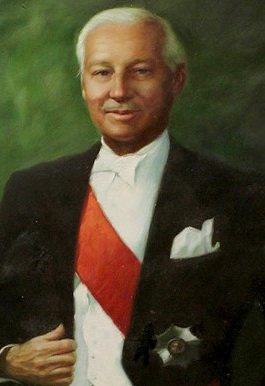
The Honorable Shelby Cullom Davis served as U.S. Ambassador to Switzerland from 1969 to 1975. He was appointed by President Richard Nixon and continued to serve under President Gerald Ford. Upon his return to the U.S., Ambassador Davis assumed the leadership of the American Swiss Association, as the organization was then called, serving as honorary chairman until the end of his life.
Ambassador Shelby Cullom Davis had a remarkable career as a scholar, public servant, and businessman. He developed deep and personal ties to Switzerland early in life, even meeting his future wife on a train ride to Geneva where they both obtained doctorates from the Graduate Institute of International Studies before returning to the United States. In 1933, Davis became an economist for his brother-in-law’s firm, Investment Corporation in Philadelphia. His 1940 book, America Faces the Forties, caught the attention of New York Governor Thomas E. Dewey, who ultimately hired Davis as his economic adviser and speechwriter. In 1944, Governor Dewey appointed Davis as the first deputy commissioner of insurance in New York.
After World War II, Davis founded Shelby Cullom Davis & Co., an investment banking firm specializing in insurance securities. He served as managing partner of the firm until 1969, at which time he was appointed U.S. Ambassador to Switzerland, a position he held with distinction until 1975. One of Ambassador Davis’s defining successes during his tenure in Bern was the negotiation of the 1973 Treaty between the United States and Switzerland on Mutual Assistance in Criminal Matters, which passed unanimously in both the Swiss Parliament and the U.S. Senate. Upon his return to the United States in 1975, he assumed an active leadership role with the American Swiss Foundation, serving as chairman and president until 1989, and as honorary chairman until his death in 1994.
Throughout his life, Ambassador Davis remained passionately committed to the notion that the health of a nation depends on its citizens’ intellectual vigor, selfdiscipline and self-reliance, respect for the law and private property, and above all else, unselfish concern for the public good.